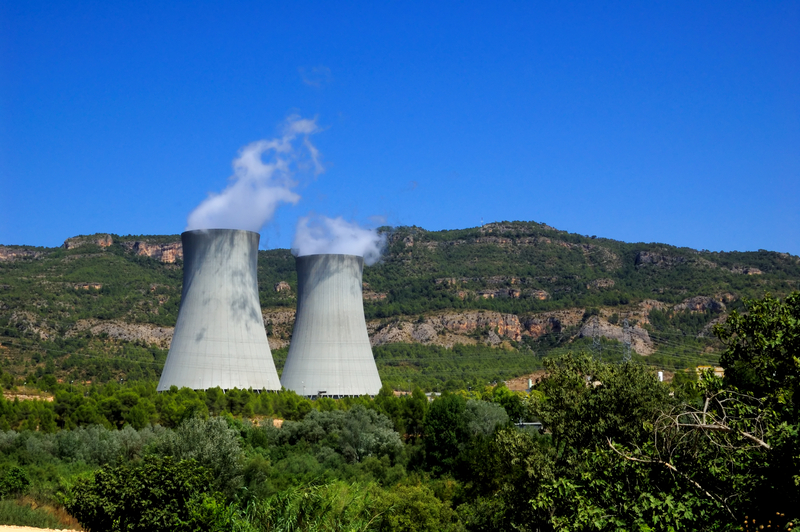The main owners of Spain’s nuclear power plants, Iberdrola and Endesa, have decided to alter their approach in negotiations with the government regarding their intentions to extend the operational life of their reactors. They now seek to engage directly and exclusively with the third Vice-President, Sara Aagesen, to discuss not only the extension of the Almaraz power plant in Extremadura, whose closure was initially planned, but all seven core reactors that constitute the Spanish nuclear fleet. This significant shift signals a broader strategy aimed at securing the future of nuclear power in Spain.
The Letter to Aagesen: Catalyst for the Strategic Change
Industry sources attribute this change in strategy to a letter sent by the two electricity companies to Aagesen two weeks ago, conveying their position in favor of extending the operational life of nuclear power plants in Spain. Prior to Easter, Endesa and Iberdrola had considered an extraordinary meeting of the Almaraz and Trillo (CNAT) plant management boards, where they, along with the third owner, Naturgy, would begin to explore the possibility of requesting a two or three-year extension for Almaraz. This would allow each of its two reactors to comply with their 10-year valid licenses and defer their respective decommissioning dates, planned for 2027 and 2028, to 2030, without undergoing a new review by the Nuclear Safety Council.
However, the date for this meeting was never confirmed – a regular meeting occurred, but it did not address the extension issue. Industry sources now doubt that there was ever a firm intention to hold such a meeting. If there had been, it is now clear that this meeting will not take place. Beyond the form of dialogue with the Ministry, the change in the negotiation strategy for nuclear extensions also broadens its scope. Iberdrola and Endesa are no longer solely focused on extending Almaraz, the first block scheduled for closure under the current calendar, but on the entire nuclear park, which comprises five power plants and seven reactors.
Majority Owners Aim for Comprehensive Solution
The two electricity companies hold majority stakes in all nuclear facilities. Endesa is the sole owner of Ascó I, and Iberdrola is the sole owner of Cofrentes. They also have stakes in Ascó II and Valdellós II. In the case of Almaraz I and II, as well as Trillo, they share ownership with EDP and Naturgy, with the latter holding only a more than 12% stake in the Trillo plant (34.5%).
Other industry sources emphasize that any decision to extend the lifespan of a particular plant, regardless of the agreement reached, must necessarily have the unanimity of all its owners – including Iberdrola, Endesa, and also Naturgy, for instance in the case of Almaraz. However, the initial two companies are taking the step of seeking to negotiate with Aagesen in a smaller committee, under the premise that the company chaired by Fernando Reynés appears, for now, more interested in generating electricity with natural gas, which brings them more benefits than nuclear energy. In any case, Naturgy’s position is to extend the useful life of Almaraz until 2030 while negotiating the entire calendar for all plants.
Ministry of Ecological Transition’s Stance: No Formal Proposal, No Rejection
The Ministry for the Ecological Transition views the letter as a mere statement of intent. This week, it was reiterated that the Vice-President still does not have a formal proposal on the table to change the nuclear power plant closure schedule. They stated, “They have not submitted any request for an extension,” repeating the government’s conditions: “that it be compatible with nuclear safety and security of supply, and that it does not cause economic harm to consumers and taxpayers.” As of today, the Ministry emphasized, “we have no news regarding this.” While the Ministry does not feel pressured to negotiate based on the letter, it is also not attempting to reject it, asserting that it has no more acknowledgment of receipt – neither for nor against – than the message sent to the media.
Tax Reductions as a Key Demand of the Utilities
In their letter, Iberdrola and Endesa not only insisted on extending the operational life of the facilities but also demanded that this must entail a reduction in the taxes they pay, which, according to the companies, render nuclear energy unprofitable. For example, they insist that there is no sense in paying a tax on spent nuclear fuel – the tax on the production of spent nuclear fuel and radioactive waste from the generation of nuclear energy – which they claim has no other activity. They propose to reduce their liquidation due to a reduction in the “Enresa tax” for the dismantling of the facilities and waste disposal.
In addition to this tax, they seek to abolish or reduce all others that nuclear power plants are subject to, in line with what two of the parties most committed to extending the life of the plants, the PP and Junts, have proposed and won in recent elections in Congress, along with Vox and an ERC that does not want to be left behind. On Thursday, a motion was passed at the request of Junts, which foresees a series of tax reductions, including “the introduction of a 0% tax rate on the value of electricity generation, another tax amount that power plants pay, provided there is no tariff deficit. The PP, which is the author of a non-legislative proposal, defended the same measure a few months ago, also passed in February – with the support of Vox and the abstention of Junts, ERC, and PNV. At the time, it was a non-binding initiative, but the quorum it managed to achieve to be passed gave the PP the impetus to register a bill a few weeks later, which foresees a 10-year extension and, consequently, a recalculation of the ENSA tax, which could become law and mandatory after the parliamentary groups voted for its parliamentary processing.




